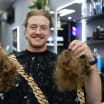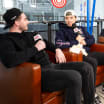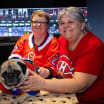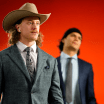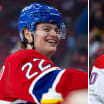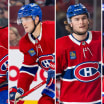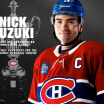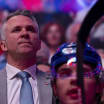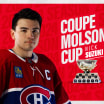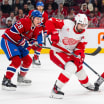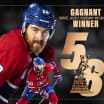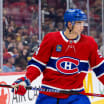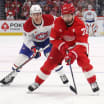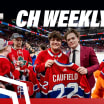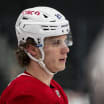This interview has been modified from its original, published in the February 2013 edition of CANADIENS magazine (Vol. 27 No.1).
+++
Canada is renowned for many things, but being a breeding ground for tennis stars has never been one of them. That's all changing with proud Canuck Milos Raonic's recent ascent to the top of the tennis world. Born in Yugoslavia before swinging his first racquet near his family's home in the suburbs of Toronto, Raonic has been making a name for himself on the international scene with his devastating serve and his precision drop shots on the court. We caught up with the 26-year-old ace to learn more about how he emerged from a hockey hotbed to become one of the most promising tennis stars north of the border.
Off the ice... with Milos Raonic
A chat with the Canadian tennis star
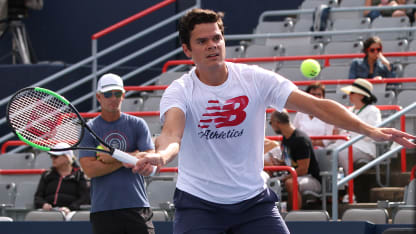
© Pierre Fortier
By
Hugo Fontaine @canadiensMTL / canadiens.com
Your dad has a PhD and your mom has a Masters degree so we assume education is important in your family. Was it a tough sell when you told them you were skipping university to become a professional tennis player?MILOS RAONIC: I didn't have to sell it to them because they told me it was my decision. What ended up happening is they told me I had to stay and do university courses until I was in the Top 100, which I was in 2011, but I had to put that aside since I was too busy with my obligations. But my dad back then was filling out applications to a lot of universities in Canada for me just to reassure himself a little bit. My parents never let me see it, but I know they must've had a few sleepless nights because of it.
You were one of the first players to join Tennis Canada's National Training Centre in Montreal when it opened in 2007. What's the first thing you do as soon as you come back to town?MR: Go to Schwartz's. When I came to Montreal for the Davis Cup a few months ago, I got in on a Sunday and I went to Schwartz's Sunday, Monday, Tuesday and Wednesday. (laughs) I can eat there a lot - probably too much.
We've seen you post comments on Twitter about going to Arcade Fire shows and eating smoked meat at Schwartz's. Are you sure you're not really a Montrealer?MR: (laughs) I owe a lot to Montreal but I'm still a Toronto boy.
Schwartz deli Montreal! Sooo good! pic.twitter.com/oaiJC9Whu4
— Milos Raonic (@milosraonic) July 24, 2013
You're not a Leafs fan, are you?MR: (laughs) I do support the Leafs.
Your family moved to the Toronto suburbs from Yugoslavia when you were really young. Did you ever play hockey as a kid?MR: I played street hockey quite a bit because we lived in a gated townhouse community, so the streets weren't too busy. But I've never played on the ice and I'm not going to try skating now and risk getting hurt.
If you had to choose an NHL player as a doubles partner, who would you pick?MR: Wayne Gretzky. He's become a good friend over the last little while and I was fortunate enough to have dinner with him earlier this year and we still keep in touch quite a bit. His youngest daughter is really into tennis and he really enjoys it, too. I've picked his brain quite a bit when it comes down to specific things; he's always been there for me when I needed to speak to him regarding sports in general.
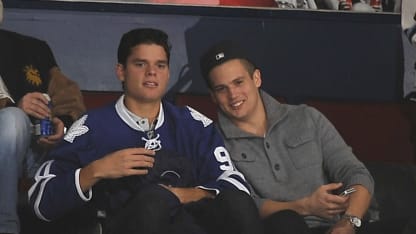
© Graig Abel/Getty Images
Playing an individual sport means you don't have a built-in crew to hang out with on the road. How much time do you spend with your competitors off the court? Who is your best friend in the sport?MR: We go to dinner and spend quite a bit of time together. One player that I get along really well and that I go to dinner most consistently is Feliciano Lopez. He's quite a bit older than I am but he's a very kind person. He's very open and he's really easy to talk to, which is a big thing for me. I get along well with the Spaniards because of my coach and where I train as well as all the former Yugoslavians and the Croatians-Serbians because of the language I speak. And obviously with Daniel Nestor, but he's quite a bit older. We have quite different interests. (laughs)
How does the pressure of representing your country at the Olympics compare to playing in any of the Grand Slam tournaments?MR: It's a little bit different in the sense that in the Olympics, all of Canada is sort of watching and there are so many sports. When it changes to the tennis, it's on everyone's TV. When it comes to Grand Slams, it's more tennis fanatics than casual fans who watch. It's a different kind of pressure because as a child, your dream is to win a Grand Slam tournament. It would be an honor to win an Olympic gold medal and I want to do Canada proud, but the title I would like to win the most is Wimbledon.
Were you frustrated that just three days after you and Jo-Wilfried Tsonga established a new record for the longest Olympic singles match, Roger Federer and Juan Martin Del Potro set a new one?MR: No, because I was on the wrong end of that record! (laughs) If I would've been on the winning end I would've been a little bit upset. Now I don't have to worry about beating my own record and trying to win at the end. It was a nice relief.
What player were you most in awe of facing in an actual match? Or does that even enter your mind when you step on the court?MR:Not really. I'd love to one day achieve everything that [Roger] Federer has, but I also want to one day become the best player in the world. So when I faced him, he was there on the other side trying to take something from me that I wanted.
In your opinion, who is the greatest tennis player of all-time?MR: I would love to say Pete Sampras because he was my idol, but I would have to say Federer.
Does Canadian tennis get the credit it deserves?MR: It's on the right track but it has a long way to go. I just hope I can be a big part of that.
What do you need to do to grow the game faster over here?MR: There's a lot of talent and ability in Canada, but it all goes to hockey. That's why I try to make a big stand to show kids that they can succeed in tennis here. Maybe not as much and as consistently as you can in hockey, but there's such a great success in tennis and you can make it as a Canadian. I want that message to get across and that's why those events when I play for Canada are special.
Your serve is one of the most devastating on the men's circuit. What's your secret?MR: A lot of practice. When I was young, I would go practice with my father at 5:30 in the morning. There weren't that many kids who wanted to practice at that time before school. All I could do was to serve. My dad didn't know how to play tennis. So I just took a bucket of balls and served.
How often do people recite the "Another game for Milos" quote from Seinfeld to you?MR: It happens quite a bit. It happens a lot in the stands when I play. A lot! Especially when it comes to National events. It's pretty funny. I'm just not comfortable when people ask me to say it because I don't know if I can get that accent right. I giggle when I hear other people saying it.

